Milan, from October 16 to November 13, 1966.
- The Mondo Beat Movement becomes a reality.
- Vittorio Di Russo subjected to a mandatory expulsion order.
- Flood of the Arno. The youths of the Mondo Beat Movement flock to Florence to rescue a heritage of universal value.
- Printing of the first issue of Mondo Beat magazine.
- Vittorio Di Russo arrested, mistreated and imprisoned.
As suggested by Vittorio Di Russo, the name "Beat" given to the Movement was successful, because it was liked by the young people who frequented Piazza Duomo and the underground passages of the Cordusio metro station, who began to call themselves Beats.
Vittorio Di Russo's popularity among young people was great, as everyone rallied around him when he appeared. He often took the Beats to a section of the Radical Party, which was near Piazza Duomo. At the time the radicals only had this section in Milan and there were very few of them, but Pietro Stoppani and Roberto Pieraccini, who led their section, were intellectuals who had sensed that Mondo Beat would go far, so they were happy to receive us and let us use their facilities.
Even the anarchists of the Sacco and Vanzetti section, who were much more numerous than the radicals, had made their facilities available to us, but their section was too far from Piazza Duomo to be reached on foot and we did not go there often, instead Giuseppe Pino Pinelli and Gianoberto Pinky Gallieri, who leadered the anarchist section, often came to meet us in the city centre.
Mondo Beat was appreciated by other extra-parliamentary groups for its resistance and growth despite being subjected to raids by the police and carabinieri. The young people of Mondo Beat had freed themselves from their families, had dropped out of school, and had not given in to paid work, while almost all the anarchists and radicals led a routine life and their activism was limited to free time. Furthermore, Mondo Beat was appreciated for the many girls who fully participated in the Movement, an unprecedented phenomenon in Italy, given that no other extra-parliamentary group had girls participating. Thus, anarchists and radicals courted the Beats and asked to organize public demonstrations together with them.
As for the nocturnal parties, Gunilla Unger and Melchiorre Gerbino were assiduous. There they met young people who had fled their homes, these youths being significant to the Mondo Beat Movement. At these parties, small groups of very young people made love here and there, in the indifference of others. There were girls who attracted shy boys and initiated them into sex with a sort of missionary commitment. I think this type of phenomenon occurs in epochal changes, when passionate women feel more committed towards the group rather than to a single partner.
Sometimes, before the late-night parties, we went to the house of Fernanda Pivano, a translator of American writers, who was much celebrated by the establishment media. In her house on Corso Manzoni, which also served as a literary salon, she welcomed young people with the intention of publishing a book with their protest writings, but it was understandable that the comings and goings had the purpose of giving resonance to the works of writers of the Beat Generation, which she translated into Italian. Melchiorre Gerbino did not like Fernanda Pivano from their first meeting, as she downplayed the importance of the Dutch Provo Movement, completely ignored the Free Speech Movement and defined youth malaise in Italy as a subcultural phenomenon. While Vittorio Di Russo was convinced that participation in Fernanda Pivano's literary salon was positive for Mondo Beat, Melchiorre Gerbino felt uncomfortable there, and he was right to feel so, as Fernanda Pivano would turn out to be an agent of the CIA and an informant of the Milan Police Headquarters, as we will see.
In the meantime, the Mondo Beat movement was expanding greatly, but police raids were also intensifying and young people who did not respect the order to leave Milan were arrested and sentenced to a month in prison.
When police raids were more intense, Vittorio Di Russo began to show signs of confusion. During the day he wandered aimlessly through the city center and at night he slept wherever it happened, instead of coming to Melchiorre Gerbino and Gunilla Unger's apartment, of which he had the keys and a room all to himself, an apartment easy to reach as it was close to a subway station.
Melchiorre Gerbino did his best to convince Vittorio Di Russo to look for a fictitious certificate of employment in Milan, to avoid receiving a mandatory expulsion order for "vagrancy", but any time he tried, Vittorio had got irritated. He believed the police would not have taken action against him since he was a known person. And so Melchiorre Gerbino had given up on insisting, but with death in his heart, aware that Vittorio Di Russo would end up in trouble. Melchiorre Gerbino instead tried to protect himself, so he asked the lawyer Pisano, a friend of his father, to help him find work in Milan. The lawyer Pisano was an American citizen of Italian origins, who had a law firm in Milan where Gunilla Unger worked as a secretary.
(Agenzia Franco Sapi)
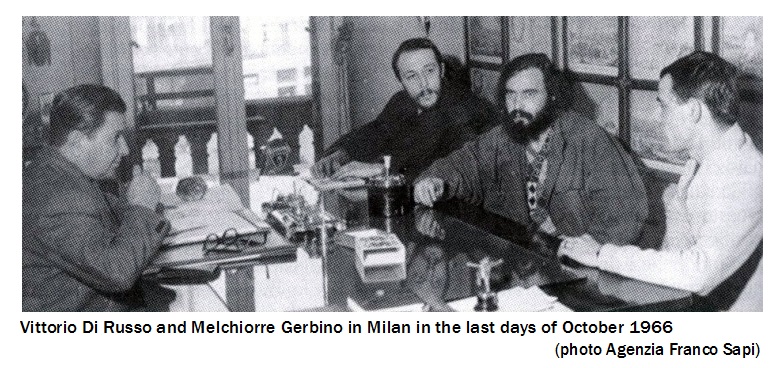
(Foto: Agenzia Franco Sapi) Vittorio Di Russo and Melchiorre Gerbino in Milan in the last days of October 1966.
As the days went by, Vittorio Di Russo's health worsened. On November 1, at Mr. Donà's house in Verona, where we were in the company of Fernanda Pivano, Vittorio Di Russo had a serious crisis of paranoia. We hadn't taken any drugs but we had drunk some good wine. Vittorio's crisis would have worsened in the emergency room of the Verona hospital and put into paranoia the doctor who should have calmed him down, so that Melchiorre Gerbino had to calm Vittorio and the doctor.
------------
At this point it is worth opening a parenthesis to tell how Fernanda Pivano, ten years after we were in Verona, published a book, "C'era una volta un beat" (Once apon a time a Beat), in which she produced a photomontage to show how in Verona we were at the house of a certain Giorgio Bertani (and not at Mr. Donà's, where we had actually been) and how on that occasion Vittorio Di Russo and Melchiorre Paolo Gerbino were indoctrinated by the PSIUP, a Marxist political party.
But, due to this imbroglio, it would have turned out that Fernanda Pivano was a CIA agent, as years after the publication of her book, the CIA revealed that the PSIUP had been created by the CIA itself with the aim to sabotage the association of two socialist parties, PSI and PSDI, which were in government in Italy.
Thus Fernanda Pivano with this photomontage had attempted to achieve a double result, namely that of diminishing the history of the Mondo Beat Movement by showing how the two most charismatic characters of this movement, Vittorio Di Russo and Melchiorre Paolo Gerbino, were communists (while they were anarchists) and, on the other hand, she would have encouraged the contestatarians to vote for the PSIUP in the elections, in order to have their votes delivered to the CIA.
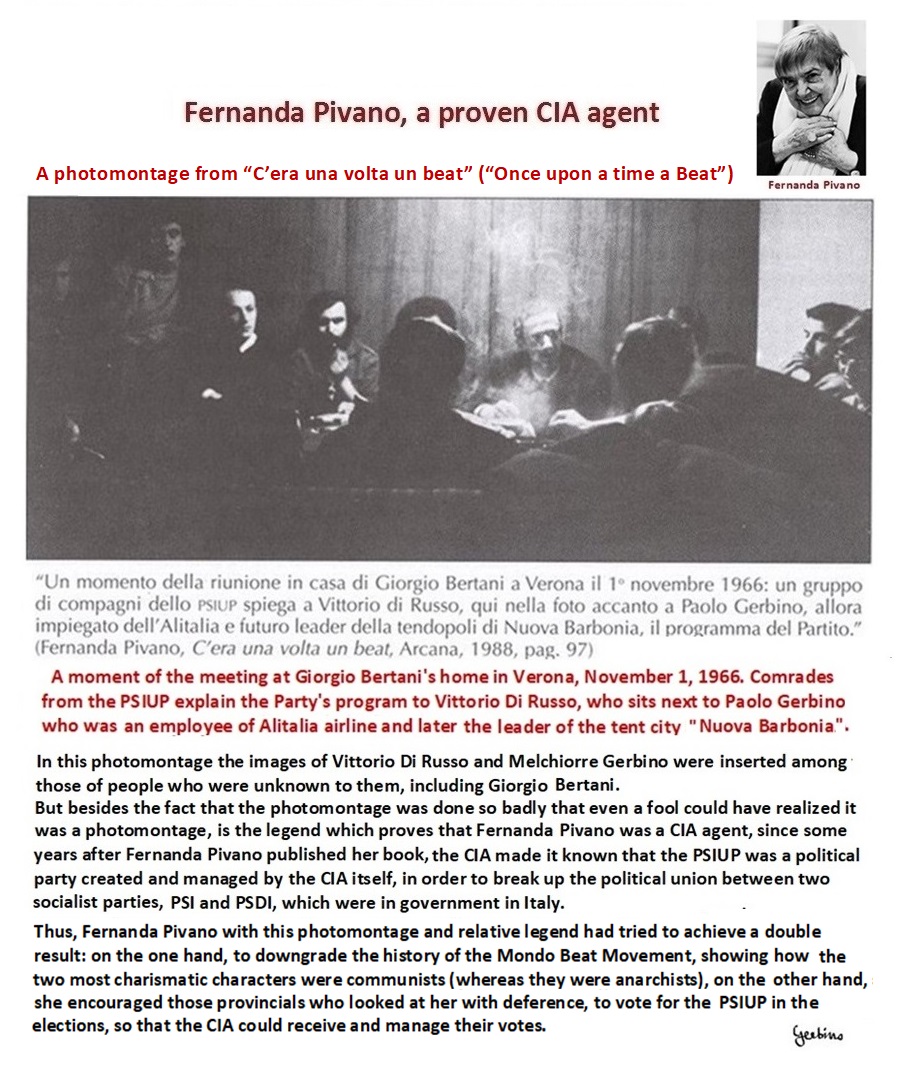
Fernanda Pivano, a proven CIA agent
Jack Kerouac, who came to Italy in 1966 to give an interview to the state television and on that occasion was assisted by Fernanda Pivano, to a journalist who asked him what he thought of her, said verbatim: "A Jewish Communist spy".
Fernanda Pivano was not Jewish, but Jack Kerouac, who when drunk saw Jews even where there were none, intended to inflict on Fernanda Pivano the heaviest insult in his repertoire. There is no doubt that this episode occurred, as Fernanda Pivano herself tells about it in her aforementioned book "C'era una volta un beat".
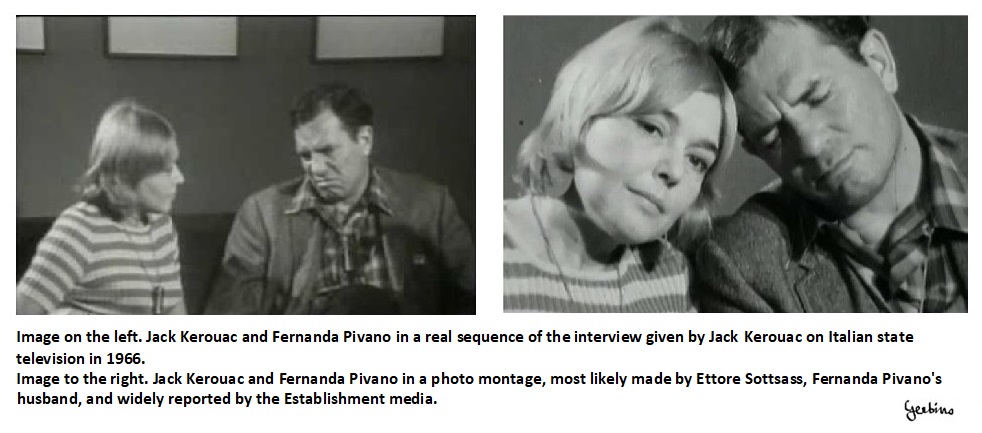
Jack Kerouac and Fernanda Pivano in a real sequence and in a photomontage.
Image on the left. Jack Kerouac and Fernanda Pivano in a real sequence of the interview given by Jack Kerouac on Italian state television in 1966.
Image on the right. Jack Kerouac and Fernanda Pivano in a photomontage, most probably made by Ettore Sottsass, Fernanda Pivano's husband, and widely diffused by the media of the Italian Establishment.
------------
Returning to the chronological reconstruction of the history of the Mondo Beat Movement, on November 2 Vittorio Di Russo had another paranoid crisis (after the one the day before in Verona) and this time in Milan, and precisely in the literary salon of Fernanda Pivano.
Fernanda Pivano had in fact been asked to write the editorial of the first issue of Mondo Beat magazine. The idea came from Vittorio Di Russo but Melchiorre Gerbino was strongly opposed, since Gerbino himself wanted to write the editorial. But in the end Gerbino had to give up, because it seemed that he wanted to write the editorial out of exhibitionism and not because he didn't like Fernanda Pivano's approach towards Mondo Beat. So it was that Melchiorre Gerbino himself went to Fernanda Pivano's literary salon and asked her to write the editorial. Then she promptly took pen and paper and wrote: ."I don't know these guys from Mondo Beat but, like when we ourselves were young and the fascist hierarchs arrived in Turin and we were monitored by the police....".
The torture to which Melchiorre Gerbino was subjected would not have lasted more than 10 minutes, since Fernanda Pivano was overworked and could not grant more. Once outside hes apartment, Melchiorre Gerbino threw that historic article into a rubbish bin in Corso Manzoni, while Vittorio Di Russo was arriving there. Vittorio retrieved the piece of paper, read it and got angry at Fernanda Pivano. Climbing the stairs and entering the salon, Vittorio Di Russo headed, to the astonishment of half a dozen spectators, towards Fernanda Pivano, moving his head like an attacking bull "I will gore you, Fernanda! ... I will gore you!". But, then, the imposing figure of Fernanda Pivano's husband, architect Ettore Sottsass, rose from the shadow of an armchair, loudly reciting a threatening monologue... This was the perfect opportunity for Melchiorre Gerbino to leave that literary salon, and forever.
The day after that theatrical situation in Fernanda Pivano's salon, a carabinieri patrol found Vittorio Di Russo asleep in a corner of the ground floor of Duomo metro station. He was brought to the Police Headquarters where he received a mandatory expulsion order from Milan, for vagrancy, and a warning to stay away from Milan for a period of five years.
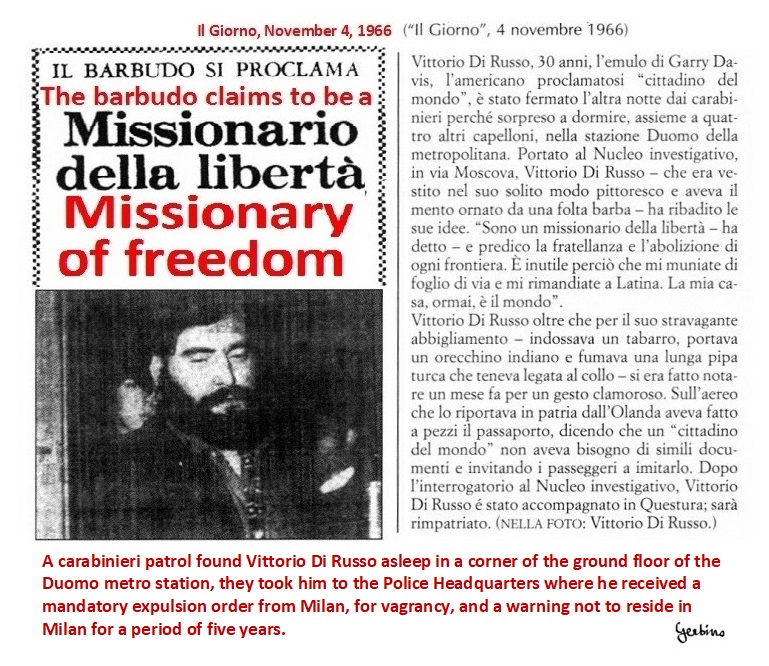
(from Il Giorno) Vittorio Di Russo received a mandatory expulsion order and a warning not to reside in Milan for a period of 5 years.
---------------
November 4 was the day of celebration of Italian armed forces. On that morning, groups of activists manifested against compulsory military service in the center of Milan. To avoid being arrested by the police, the activists dispersed from time to time among the people who watched a military parade.
Umberto Tiboni and Melchiorre Gerbino, who were among the activists, lived dark hours, due to Vittorio Di Russo's situation, of which they had read in the newspapers, and because of the decimation to which the Movement was subjected by continuous police raids. But, at some point, the rumor spread that the Arno river had broken the banks and flooded Florence. Once confirmed, this tragic event offered the youths of Mondo Beat the opportunity to rush to Florence to rescue a heritage of universal value and escape the hunt to which they were subjected in Milan. Thus, almost all the youths of Mondo Beat rushed to Florence, where they arrived as first responders. In Florence, they committed themselves with such generosity that they were baptized Mud Angels (Angeli del Fango) by the media. Having seen pictures of them, hundreds of other young people would have rushed to Florence, from all over Italy and from various European nations, and also Americans and Australians who were visiting the Old Continent. Since many young foreigners would have fraternized with the youths of Mondo Beat, they would then have come to Milan to participate in the Mondo Beat Movement. Indeed, it was in the mud of Florence that Mondo Beat became that international movement from which the Contestation would be born.
To be noted that none of the Italian governments which have succeeded from the time of the Flood of the Arno have recognized that the young people of the Mondo Beat Movement were the first to rush to the rescue of Florence. The same omission is made by the Enciclopedia Treccani, which claims to be a serious encyclopedia. Vatican vetoes have reduced Italian official culture to such an obscene standard.

(from L'Unità) Columns of youths in Florence to help the city to revive.
Back to the chronological reconstruction of the history of the Mondo Beat Movement, on November 6, Umberto Tiboni and Melchiorre Gerbino were discreetly informed by Giuseppe Pinelli, the trustee of the Sacco e Vanzetti section, that Vittorio Di Russo had not complied with the mandatory expulsion order and was hiding in Milan, protected by the anarchists.
On November 9, Melchiorre Gerbino, thanks to Mr. Pisano, the American lawyer friend of his father, found work at the booking desk of Alitalia airline at Linate airport. This work, a dream for many, was a martyrdom for him, but he consoled himself with the words of the Prophet Muhammad, peace be upon Him, who said that the conditions worthy of man are glory and/or martyrdom.
Indeed, back from work, Melchiorre Gerbino had to devote himself to prepare the layout of the first issue of Mondo Beat magazine. A heavy commitment, as he had to type all the articles on mimeograph matrices, a job which he had to do alone.
On November 12, the great event, as they were ready to print the first issue of Mondo Beat magazine in the Sacco e Vanzetti section.
Giuseppe Pinelli had placed reams of paper on a table near a hand-cranked mimeograph and poured ink on the roll and applied the first matrix. He said "Vado!".
"Vado" means "I go" in Italian, but with an exclamation point it takes the meaning of going towards something exceptional, if not fatal.
Gunilla Unger and Carmen Russo, who wore makeup for the occasion, were smiling in the deafening noise made by the hand-cranked mimeograph, while Umberto Tiboni, Gennaro De Miranda and Melchiorre Gerbino were catching on the fly the sheets delivered by the mimeograph, to lay them down on the floor to dry. The sheets to be printed were seven thousand, first on one side and then on the other, to obtain one thousand copies of the issue.
Vittorio Di Russo arrived late at night, brought by someone who waited for him in a car. Vittorio stayed with us just the time to raise a glass of wine. The rest of us worked all night and finished the job the next day around noon. The printed material was then taken to the apartment of Gunilla Unger and Melchiorre Gerbino, where it was collated.
On the evening of the same day, Melchiorre Gerbino went to to meet Giuseppe Pinelli and delivered him 100 copies of the issue, to be given partly to Vittorio Di Russo and partly to the Sacco e Vanzetti section, which had kindly provided the paper for printing. From that same evening, copies of the issue were sold by young people who had legal residence in Milan, on whom the police could not impose mandatory expulsion orders.
On November 19, Vittorio Di Russo came out of his hiding place and went to distribute copies of the Mondo Beat issue in the underground passages of the Cordusio metro station. There he was arrested by two plainclothes policemen. Taken to the Police Headquarters, he was detained for a week. The procedure of his detention was illegal because, according to the law of the time, after a maximum of three days of detention, the police had to release the citizen or indict him and hand over the file to the judiciary, which had to decide whether the subject should wait in prison or on the loose before trial. None of this for Vittorio Di Russo, who suffered beatings and mental torture for 7 days while he was detained. Then he was taken to court, sentenced to a month in jail and incarcerated in San Vittore Prison.
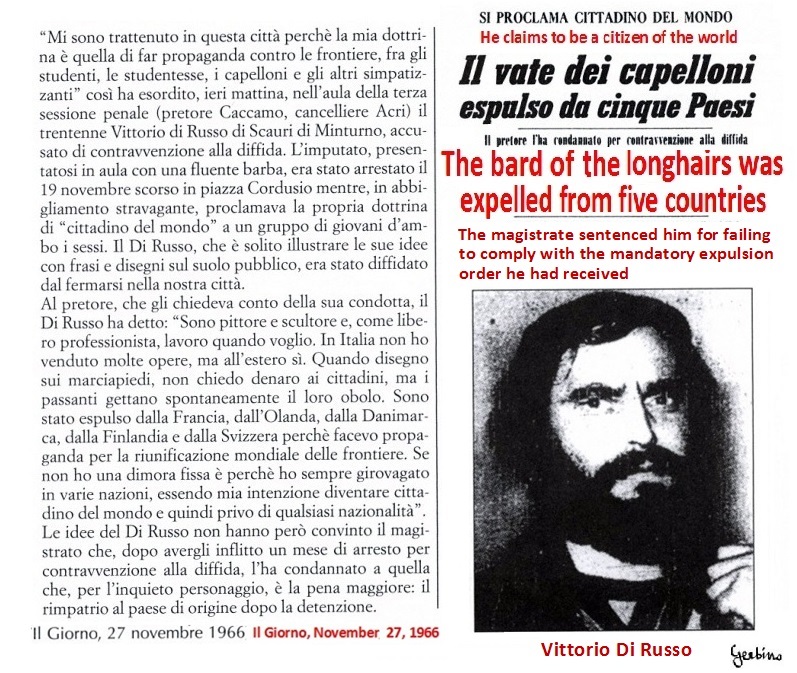
(from Il Giorno) Vittorio Di Russo arrested, mistreated and imprisoned.





